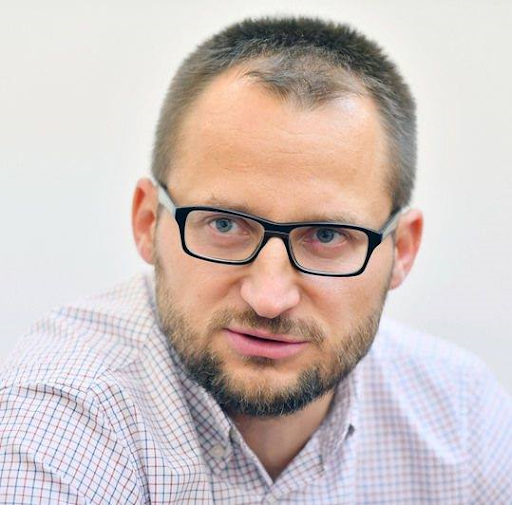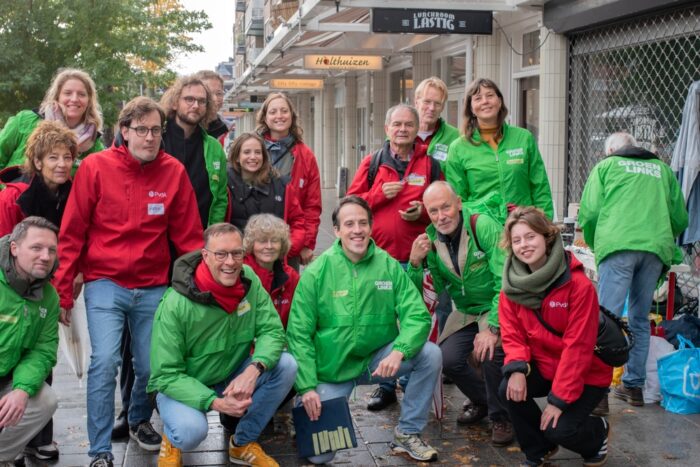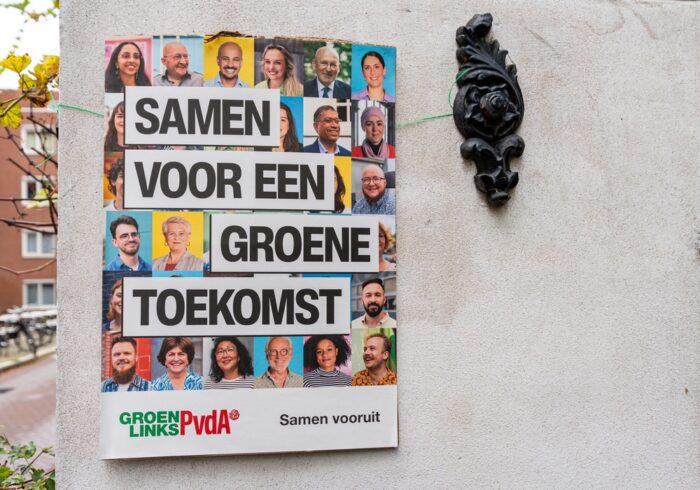Find all related Progressive Post
Progressive Post

It should not be surprising that a country feeling like a ship in a storm without a captain elects the strongest protector. However, one should not forget that there is no way to build a sustainable welfare state through culture wars, hate, fear, homophobia and xenophobia. People deserve solutions instead of shared anger.
It is a sign of a healthy democracy, actually the very point of it, to accept the winner, even if we do not fully share his policies. The Slovak parliamentary elections produced a clear winner. The highest turnout in 20 years of 68.5 per cent means that the winner has a clear, democratic mandate and deserves a chance to build a government. From abroad it can appear as a shocker that a politician written off by most only four years ago would return for his 5th election victory. But not from inside. Counting together the abysmal appearance of the previous government, their disastrous way of communicating with society during the pandemic, and their implosion one year ago over never-ending internal fights, leaving the country without real leadership in times of ongoing war, energy crisis, skyrocketing inflation, it is not surprising that such a radical failure called for a radical answer.
In the case of Smer-SSD and Robert Fico, you could easily say, that luck – factors outside of his impact – met the most hardworking, the one with the biggest stamina. It is also called the survival of the toughest, the unyielding. And why should Slovakia – a country with such a high level of scepticism, frustration in the society, such high distrust in institutions and people, stagnating or degrading in crucial indicators of life quality and growth perspective – be the exception from a European right-wing or anti-systemic trend?
So much for the reasons. But there is a downside also, of course. There is an old saying in US-campaign vocabulary stating “we campaign in poetry, we govern in prose”. Adapted to the Slovak parliamentary elections we could ask: “can you calm the country after setting it on fire, metaphorically speaking, with a campaign based on fear and hate”? It speaks for itself, that the winners of the election, measured by better results than expected, were the parties running the most aggressive campaigns, and not coincidentally some of their leading figures have been involved in a physical fight, one that pitted the former prime minister against the former minister of interior, live on camera. Elections are, by definition, not feasts of rational discourse, emotions are its essence. However, in a country with these big challenges, people deserve much more than shouting, name-calling, hate speech and amplified anger. The question of whether the people we elected can switch from a tribal warfare mentality to a 100 per cent focus on issues our country has to solve, will finally decide the fate of Slovakia for the next decade. They would be well advised to realise, that you cannot run a country, especially in these difficult times, in a permanent mode of campaigning on steroids.
This brings us to the second disturbing feature of the Slovak elections, relevant especially from a Social Democratic perspective. We should not be surprised, and the ‘western’ S&D family would be well advised to accept, that Social Democracy in central-eastern Europe will always, or for a long time come, be more conservative and more nationalist. Such are the times, such are our societies, and such is our self-understanding as younger, less affluent, disadvantaged, sometimes feeling discriminated against or not listened to by the members of the European family. However, the fact is that the level of cultural warfare, especially homo- and xenophobia in Slovak politics is debilitating and counterproductive for the mission, that Social Democracy has to aim for primarily, wherever it is operating. Lifting people out of social hardship, helping them master the permanent insecurities of current times and building a sustainable welfare state, brick by brick, reform by reform, is its mission.
When this mission is intentionally overshadowed by ultra-conservative culture warfare and liberalism bashing, because of its better online virality and reach, then one clearly fails in his mission. Forgetting that oligarchy, social inequality and poverty, unbounded capitalism and its libertarian apostles are the villains we should fight against, and not gays, feminists or climate activists. Never in history and nowhere on earth did cultural warfare, hate and homo- or xenophobia help build a functioning welfare state, and support people in hard times. It is a dead end for Social Democracy, be it in the West, the East, the North or the South. And when, if not in these times of polycrisis and omnipresent social anxiety is a better time to postulate the agenda of a capable, agile, investing and redistributing welfare state, protecting and helping people in uneasy times as the main dividing line of political conflict for the years ahead? This conflict line is good politics, and it clearly is good policy. Especially in a state with these huge challenges ahead, the necessity of a new growth model, sustainable and socially balanced climate and energy policies, and massive regional development, in a state where a well-functioning public sector, from health to education, public transport, regional development, social services, housing affordability and so on, offers plenty of room for improvement. ‘Our people’, as the head of the Austrian SPÖ uses to call them, people without wealth and privilege deserve solution politics to improve their chances for a good life. Shared or amplified anger brings exactly zero benefits to their everyday lives. And for that matter, anger and blame gaming is the worst government programme one could imagine. So whatever government coalition the post-election negotiations produce, our country and its representatives, should, mentally and physically, switch from campaigning to solution mode. In the end, that is what they are paid for.
*The expressed opinions represent the personal views of the author, not of Friedrich Ebert Stiftung, Slovakia.
Photo credits: Shutterstock/ bwagner99
| Cookie | Duration | Description |
|---|---|---|
| cookielawinfo-checkbox-advertisement | 1 year | Set by the GDPR Cookie Consent plugin, this cookie is used to record the user consent for the cookies in the "Advertisement" category . |
| cookielawinfo-checkbox-analytics | 11 months | This cookie is set by GDPR Cookie Consent plugin. The cookie is used to store the user consent for the cookies in the category "Analytics". |
| cookielawinfo-checkbox-functional | 11 months | The cookie is set by GDPR cookie consent to record the user consent for the cookies in the category "Functional". |
| cookielawinfo-checkbox-necessary | 11 months | This cookie is set by GDPR Cookie Consent plugin. The cookies is used to store the user consent for the cookies in the category "Necessary". |
| cookielawinfo-checkbox-others | 11 months | This cookie is set by GDPR Cookie Consent plugin. The cookie is used to store the user consent for the cookies in the category "Other. |
| cookielawinfo-checkbox-performance | 11 months | This cookie is set by GDPR Cookie Consent plugin. The cookie is used to store the user consent for the cookies in the category "Performance". |
| csrftoken | past | This cookie is associated with Django web development platform for python. Used to help protect the website against Cross-Site Request Forgery attacks |
| JSESSIONID | session | The JSESSIONID cookie is used by New Relic to store a session identifier so that New Relic can monitor session counts for an application. |
| viewed_cookie_policy | 11 months | The cookie is set by the GDPR Cookie Consent plugin and is used to store whether or not user has consented to the use of cookies. It does not store any personal data. |
| Cookie | Duration | Description |
|---|---|---|
| __cf_bm | 30 minutes | This cookie, set by Cloudflare, is used to support Cloudflare Bot Management. |
| S | 1 hour | Used by Yahoo to provide ads, content or analytics. |
| sp_landing | 1 day | The sp_landing is set by Spotify to implement audio content from Spotify on the website and also registers information on user interaction related to the audio content. |
| sp_t | 1 year | The sp_t cookie is set by Spotify to implement audio content from Spotify on the website and also registers information on user interaction related to the audio content. |
| Cookie | Duration | Description |
|---|---|---|
| CONSENT | 2 years | YouTube sets this cookie via embedded youtube-videos and registers anonymous statistical data. |
| iutk | session | This cookie is used by Issuu analytic system to gather information regarding visitor activity on Issuu products. |
| s_vi | 2 years | An Adobe Analytics cookie that uses a unique visitor ID time/date stamp to identify a unique vistor to the website. |
| Cookie | Duration | Description |
|---|---|---|
| NID | 6 months | NID cookie, set by Google, is used for advertising purposes; to limit the number of times the user sees an ad, to mute unwanted ads, and to measure the effectiveness of ads. |
| VISITOR_INFO1_LIVE | 5 months 27 days | A cookie set by YouTube to measure bandwidth that determines whether the user gets the new or old player interface. |
| YSC | session | YSC cookie is set by Youtube and is used to track the views of embedded videos on Youtube pages. |
| yt-remote-connected-devices | never | YouTube sets this cookie to store the video preferences of the user using embedded YouTube video. |
| yt-remote-device-id | never | YouTube sets this cookie to store the video preferences of the user using embedded YouTube video. |
| yt.innertube::nextId | never | This cookie, set by YouTube, registers a unique ID to store data on what videos from YouTube the user has seen. |
| yt.innertube::requests | never | This cookie, set by YouTube, registers a unique ID to store data on what videos from YouTube the user has seen. |
| Cookie | Duration | Description |
|---|---|---|
| COMPASS | 1 hour | No description |
| ed3e2e5e5460c5b72cba896c22a5ff98 | session | No description available. |
| loglevel | never | No description available. |


